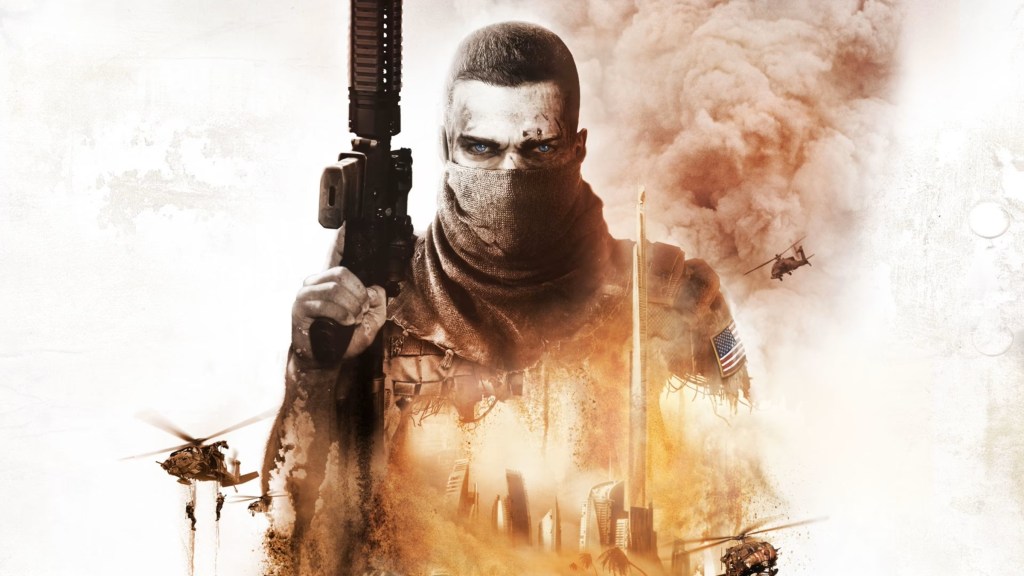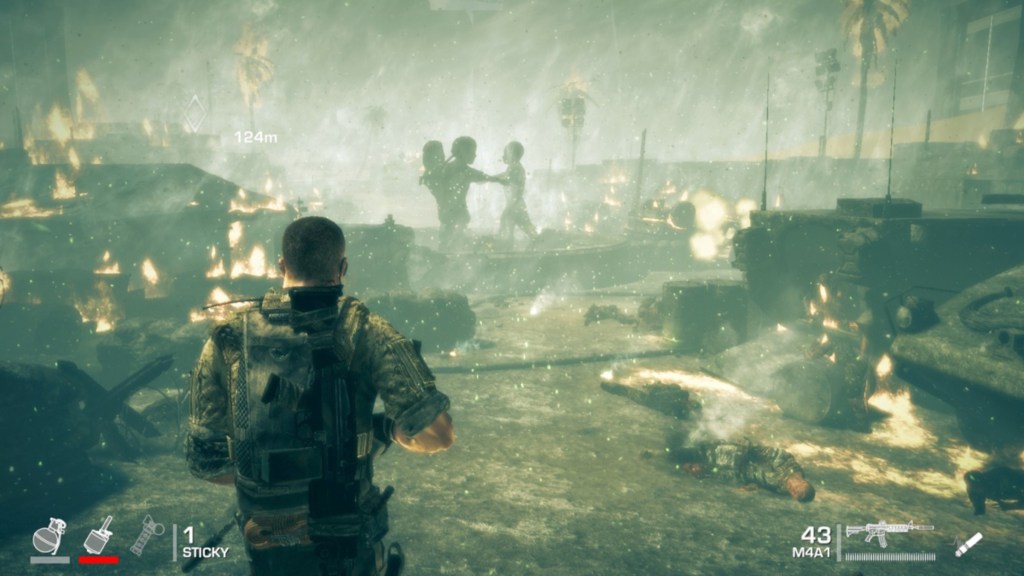Forget zombie hordes and creepy monsters; this military shooter from 13 years ago is one of the scariest games I’ve ever played. Based loosely on Joseph Conrad’s novella Heart of Darkness and the subsequent film adaptation Apocalypse Now, Spec-Ops: The Line transforms a standard military shooter franchise into something far grimmer. The result is a game that remains unforgettable even over a decade since it debuted on the PS3, Xbox 360, and PC.
Videos by ComicBook.com
I’ve played games that have had more frightening imagery or unsettling monsters, and I’ve encountered plenty of jump scares, atmospheric terrors, and grisly death scenes. None of those games has haunted me as much as this third-person shooter, which takes the standard formula defined by franchises like Call of Duty and transforms it into something that isn’t just unsettling in-universe but forces the player to contend with their own complacency in a flawed and cruel world.
Spec-Ops: The Line Is One Of The Scariest Shooters Ever

Spec-Ops: The Line initially presents itself as a standard military shooter, but gradually reveals itself to be a morally dubious and quietly unsettling riff on the genre that remains one of the most haunting games I’ve ever played. Developed by Yager Development and published by 2K, Spec-Ops: The Line focuses on Captain Martin Walker, who is sent to Dubai alongside two fellow soldiers to capture Lieutenant Colonel Konrad who has gone rogue amid a massive sandstorm that cuts off the city from the rest of the world.
Initially, the game presents the player character as a cool and confident soldier, befitting games like Call of Duty: Modern Warfare. However, as the campaign continues, the player is forced to fight the traitorous soldiers following the orders of Walker, who believe themselves to be fighting against a military that abandoned them in the middle of an overseas conflict. The tense firefights escalate as the game continues, with Walker increasingly forced to resort to more brutal methods to survive.
In the process, the game’s presentation becomes more abstract, with the graphics taking on a subtle visual edge that only makes the action more unsettling and the enemies harder to separate from allies and civilians alike. As the action picks up, the game utilizes sudden ambushes, overwhelming odds, and a host of other shooter tropes to ratchet up the tension. Throughout it all, the presentation grows subtly creepier. It all creates an uneasy element to the standard military shooter, but the real trick to Spec-Ops: The Line is the way the story also incorporates these darker edges to reveal the nightmarish truth of the narrative.
Spec-Ops Turns You Into The Monster

The real trick to Spec-Op: The Line is the way it gradually reveals that Martin Walker is the real villain of the piece. On top of that, the player’s actions all along have been making a terrifying situation even worse. While the genre has always been about the player indulging in a power fantasy by shooting down hordes of nameless enemies, Spec-Ops: The Line complicates it by having the “enemy” be other American soldiers.
The game has the player use destructive military ordnance against other soldiers and civilians alike, building to a harrowing moment where the player is forced to use White Phosphorus to painfully dispatch enemies and civilians alike in a clear war crime that even Walker’s allies are taken aback by. As the game progresses, the player’s choices are revealed to have all been influenced by their own guilt, underscoring the inhumanity of killing waves of other people indiscriminately. The fact that this is a core mechanic of the entire military shooter subgenre is the point.
It all builds to a genuinely unsettling reveal where the player discovers that Konrad has been dead all along, and his antagonism against the player has been in Walker’s head. The morally bankrupt choices have been for no reason, and the sacrifice of Walker’s allies has been for nothing. More than just a regular narrative reveal, this builds off the gameplay and the player’s actions during the firefights. The player has increasingly embraced gruesome tactics to survive and take down all their enemies, and the game makes it clear that this was morally unjustifiable. It’s not that Walker has become the villain of his own story, but that the player has become just as monstrous as they believed Konrad to have always been.
Spec-Ops Has Been Haunting My Nightmares For Over A Decade

I’ve played plenty of horror games over the years, but few have lingered as deeply in my nightmares as much as Spec-Ops: The Line. Walker’s gradual descent into madness is harrowing, but the game’s approach to revealing the truth of his mental state is what makes the game so memorably scary. It takes time, and is reflected in the way the player interacts with the gameplay instead of just impacting the cutscenes.
Players go along with each atrocity, seemingly under the assumption that it’s just the standard wartime combat that has been featured in countless games before it and afterward. It’s gameplay that can be rewarding in its brutality, but few of those titles ever force the player to reckon with the human cost of war. Rather than just hint at it, Spec-Ops: The Line openly highlights the monstrous qualities of each of these decisions and puts the blame solely on the player for going through with it. The final cutscene sees Walker reckon with his realization and deal with it in different ways, either by taking his life out of guilt or losing his mind to fully become the monster he’s been fighting all along.
These atrocities could have been prevented if the player had simply walked away from the game, but curiosity and excitement lured them deeper down the rabbit hole, until there are dozens of innocent casualties, all dead at your hands. One of the game’s “hints” during a loading screen reads “To kill for yourself is murder. To kill for your government is heroic. To kill for entertainment is harmless,” which underscores the thorny moral issues and introspective horror that is baked into the game’s premise.
You were the monster all along in Spec-Ops: The Line, in a cutting commentary on the nature of real-world conflict and the ways we can glorify atrocities for the sake of national pride or expansionist ambitions. I’ve been scared by plenty of games, but Spec-Ops: The Line has haunted me in a way few other titles have ever managed.








